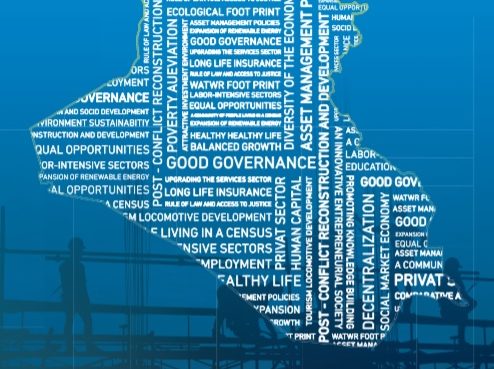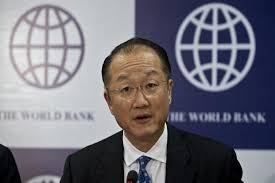
How Iraq’s Economy Can Turn Itself Around
Iraq’s outlook is bleak. Low oil prices have devastated the nation’s finances, which are already strained by the fight against the Islamic State (ISIS) and the flood of internally displaced refugees that has come with it. Although Iraqi forces and their affiliates have regained ground against ISIS, uprooting the group entirely will be a lengthy and expensive ordeal. All the while, Iraq’s critical oil pipelines and infrastructure are being damaged and, in some cases, destroyed. This has reduced domestic fuel supply and curtailed oil exports.
There is, however, an even larger threat to Iraq’s long-term stability and prosperity: its bloated, inefficient government sector. Iraq’s bureaucracy devours the major portion of the country’s resources, yet it fails to deliver basic services and infrastructure or to create real economic development. Seventy percent of the country’s budget is spent on payroll for state employees who do very little. According to Mudher Salih, an economic adviser to Iraqi Prime Minister Haider al-Abadi, public sector workers are productive for an average of just 15 minutes per day. State-owned factories, already hampered by outdated and poorly maintained equipment, produce at only a fraction of capacity, yet they employ many more workers than they need.
In more prosperous times, Iraq’s welfare state worked well enough for everyone despite its inefficiency. Iraqis were given government jobs, food rations, and subsidized fuel and electricity. At the same time, its political elites used the system to dispense patronage and increase their power. But in the current economic crisis the system is no longer sustainable. Without serious reform, the state sector could soon bankrupt the country.
Wasteful welfare states are common in resource-based economies, and Iraq’s financial woes are widely known. But surprisingly, the myriad challenges that Iraq now faces have in fact created a unique window for meaningful reforms that cut government waste, stabilize state revenue, promote private-sector growth, encourage productivity, and ultimately set the country on a path to long-term economic health.
Unlike governments that rely primarily on tax revenue, Iraq has had few checks on excessive public spending. The majority of Baghdad’s operating revenue has come from the oil industry, and during periods of high oil prices, demand for spending reforms was low. But now that the global oil market is weak, spending has outstripped earning, making calls for reform all the more powerful. In 2015, Iraq ran a budget deficit of $21 billion, and this year’s deficit is on track to reach $26 billion. Lackluster interest in bond issuances on the global market forced Baghdad to close the budget gap with currency reserves, which dropped from $75.6 billion in May 2014 to $61 billion in October 2015, and are projected to drop to $43 billion by the end of 2016. In other words, Iraq is running out of money quickly, with little relief in sight.
In addition to making reforms possible, Iraq’s dire fiscal state gives reform measures an opportunity to be more substantial and effective. Normally, amid the complex dynamics of contemporary Iraqi politics, reforms could easily be neutralized or interminably mired in bureaucracy by entrenched interests. The urgency of Iraq’s present situation, however, provides cover for Abadi to act swiftly and decisively to address government waste, rather than content himself with superficial reforms that are diluted by partisan interests without lasting effects.
Cutting government waste in Iraq is more politically viable than ever before. Popular support for reform is strong and widespread. Protests against government ineptitude are not new in Iraq, but they have taken on even more significance as of late, due in part to the support of influential religious figures like Muqtada al-Sadr, who personally led a sit-in in Baghdad’s Green Zone in late March demanding that Abadi do more to combat corruption. Even Grand Ayatollah Ali Sistani, normally taciturn on affairs of state, has openly encouraged the government to do more to combat corruption. Abadi could use popular pressure and political cover from religious leaders to help sell broader government sector reforms to the Iraqi public, treating reforms as a bitter pill that the country must swallow to in order to treat its endemic corruption.
Lastly, the Iraqi government’s financial woes give international financial institutions more leverage over the terms of aid packages and bailouts. The IMF has already committed $1.2 billion in short-term funding, and has initially approved a $15 billion standby arrangement over the next three years. This funding will be tied to strict, concrete milestones, to be overseen by the IMF’s Staff Monitoring Program, announced on March 29, that directly address structural government waste and inefficiency.
BITTER MEDICINE
For all these reasons, the conditions for reform are good despite Iraq’s difficulties. To its credit, the Iraqi government has tried to implement austerity measures, but they have been woefully inadequate so far. Government salaries were cut by a mere three percent, which will neither reduce operational costs nor improve productivity. Baghdad’s recent experiment with newly enforced import duties ranging from 5 to 35 percent was a failure. Many importers refused to clear their goods through customs, fearing that they would have to sell their goods at a loss. In fact, daily customs revenues at the Iraq–Kuwait border crossing dropped from $500,000 to zero. These efforts are little more than half measures. State-owned enterprises and bureaucratic agencies need to permanently reduce head count rather than to temporarily reduce salaries. Abadi has proposed a ministerial shakeup, replacing party loyalists with technocrats. But even if it is accepted, it would fail to remove the mid-level politicians who are responsible for most of the patronage politics in the first place.
Transforming Iraq’s arthritic, statist system into a vibrant and diversified economy may sound like an impossibly large task, but it can be done. Abadi can use the immense popular pressure and political cover from religious leaders to sell not just anti-corruption measures but also broader government sector reform. The Iraqi people may find these measures a bitter pill to swallow, but the fate of their country depends on it.
First, for reform to be effective, partisan lackeys must lose their stranglehold on the middle of the pyramid, where most patronage is dispensed, so that the bottom of the pyramid becomes leaner and more productive. Abadi should attack Iraq’s “ghost accounts”—government paychecks that go to dead, retired, truant, or nonexistent employees. Iraqi Finance Minister Hoshyar Zebari estimates that over $500 million is lost to ghost accounts in the military alone.
Scaling back pension obligations for public sector workers should, of course, come next. But most important, Abadi must make meaningful job cuts. Simply taking jobs away is, of course, difficult. But the government can make these cuts easier to swallow by offering buyouts to current employees, ahead of future layoffs. Baghdad could also offer skills training to the recently unemployed, or even offer financial benefits to business owners who hire employees laid off from the public sector.
Iraq’s onerous bureaucracy discourages entrepreneurs and investors inside and outside of the country. Starting (or closing) a company is expensive and time-consuming, as is the process for obtaining visas for foreign workers or investors looking for opportunities. Iraq’s capital structure is inflexible, and forbids multiple share classes, which restricts investment activity. The cost and uncertainty associated with private entrepreneurship makes government employment more attractive; reducing this cost and uncertainty would help reduce the state sector.
Baghdad should therefore pursue minor amendments to the country’s 2007 Companies Law, geared toward permitting more agile, business-friendly corporate structures. The government could also do more to encourage entrepreneurship. Startup incubators and early-stage investment firms have begun to flourish throughout the Middle East. Governments are beginning to realize that they are less effective than entrepreneurs when it comes to generating jobs. For example, Lebanon’s central bank has introduced a new measure, called Circular 331, which provides capital and financial guarantees to commercial banks that invest in early-stage companies. Similar programs could be adapted for Iraq, and the cost to the government would be relatively low as private banks would be doing the lending.
Meanwhile, Baghdad should pursue greater investments in its own people. Years of isolation from the rest of the world have left a less skilled population. External investors in a variety of Iraqi sectors have experienced difficulty finding qualified domestic labor. Current policies may artificially increase the number of jobs going to Iraqis, but the ultimate effect of these measures are counterproductive. Companies are required to hire expensive, lower-skilled Iraqi laborers. Consequently, companies end up overpaying for Iraqis that they must then assign to lower-skilled jobs, such as security. The added cost of these employees are ultimately passed on to the companies’ client: the Iraqi government. Rather than overspending on low-skilled jobs, the Iraqi government should launch a human development program designed to provide its citizens with vocational, management, accounting, and other training that will prepare them for the real-world economy.
Related Tweets
Lastly, if the government can’t reduce head count, it could at least work to get better returns on its payroll spending by investing that spending in infrastructural assets. The Iraqi government has struggled to execute large-scale projects, such as the construction of power plants and refineries, but it could pivot toward smaller, more achievable initiatives across the nation. The Iraq Development Board, a 1950s public works program agency, can provide a useful model here—a new incarnation could focus on road network repair, expanded light rail systems, or restoring historic marketplaces. These initiatives would not only improve Iraq’s business environment but they would also help to rebuild the nation’s crumbling infrastructure and keep Iraqis employed productively.
A FIGHTING CHANCE
Reforms are difficult to execute in resource-driven welfare states, but Iraq has a fighting chance at success. Unlike some of its Gulf neighbors, Iraq has the institutional memory of a diversified, industrialized economy piloted by its own citizens. Reducing state sector economic activity is not a leap into unknown waters. Iraq has vast agricultural and water resources, a large industrial base, strong global trading relationships, and an entrepreneurial and educated populace. If the country can create an environment that is friendly to capital investment, enact pro-entrepreneurial legislation, and curtail government waste, Iraq could become a model economy for a region still trying to wean itself off of oil revenue. Those who have followed Iraq’s economic development since the fall of the Baathist regime have seen significant progress, but there is harder work yet to do. Reform is a difficult, ambitious endeavor, and Iraq has a weak track record when it comes to generating or executing on long-range strategies. But adversity has generated an opportunity in Iraq—one that could help it work toward long-term prosperity.
Source: Foreign Affairs, April 19, 2016
https://www.foreignaffairs.com/articles/iraq/2016-04-19/reforming-baghdad








Comment here